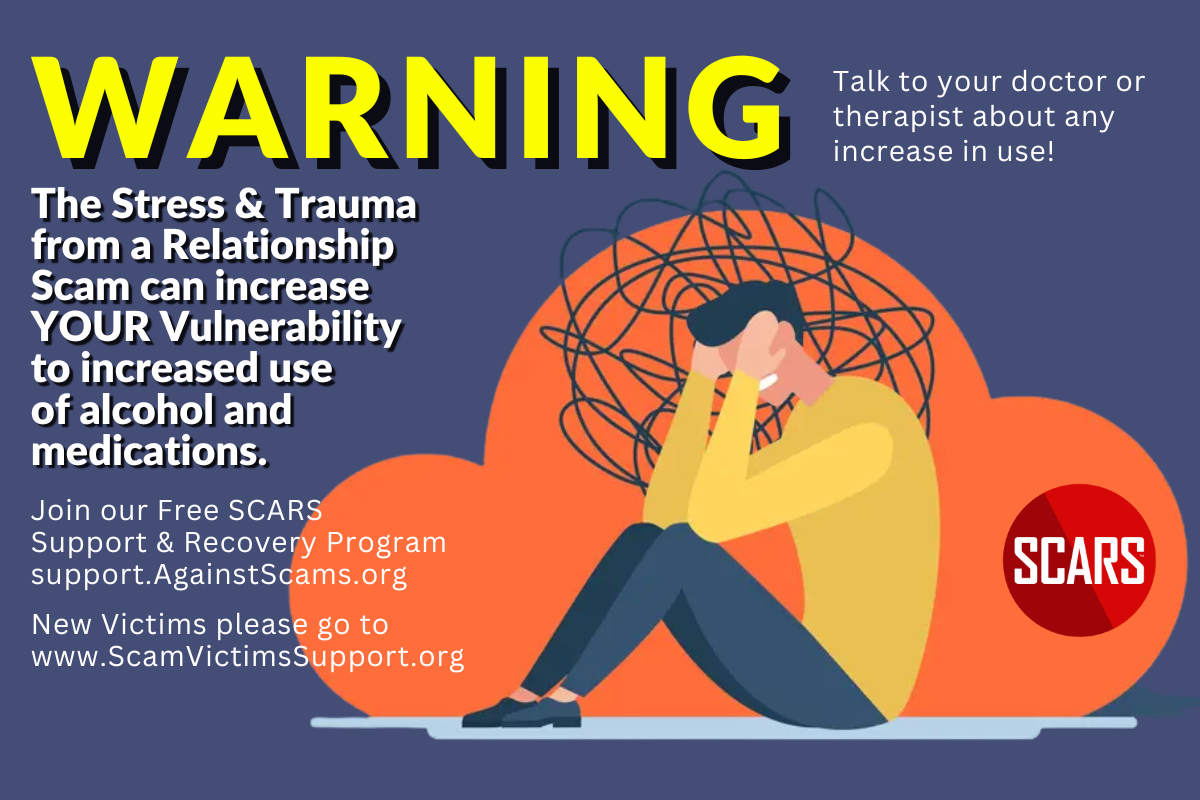Substance Abuse Susceptibility And Scam Victims
Helping Scam Victims Understand the Connection to Substance Abuse as a Coping Mechanism After the Scam
Primary Category: Scam Victim Recovery Psychology
Authors:
• Vianey Gonzalez B.Sc(Psych) – Licensed Psychologist Specialty in Crime Victim Trauma Therapy, Neuropsychologist, Certified Deception Professional, Psychology Advisory Panel & Director of the Society of Citizens Against Relationship Scams Inc.
• Tim McGuinness, Ph.D. – Anthropologist, Scientist, Director of the Society of Citizens Against Relationship Scams Inc.
About This Article
Trauma, such as falling victim to scams, can lead individuals to self-medicate with alcohol and drugs as a means of coping with the profound emotional distress and upheaval caused by their experiences. The psychological toll of scams, including feelings of shame, guilt, and betrayal, can exacerbate underlying mental health issues, making individuals more susceptible to substance abuse.
In a support group setting, several strategies can be implemented to better help scam victims with substance abuse or to prevent it altogether. These include psychoeducation about the link between trauma and addiction, trauma-informed care, skill-building focused on healthy coping strategies, competent support and validation, relapse prevention strategies, and empowerment and self-efficacy promotion.
By addressing the root causes of substance use, fostering resilience, and providing trauma-informed care, support groups can empower scam victims to heal, recover, and reclaim their lives beyond the shadows of trauma and addiction.

Understanding the Vulnerability and Susceptibility of Traumatized Individuals to Substance Abuse – an Insight and Caution for Scam Victims
Traumatic experiences, such as relationship or investment scams can have a profound impact on an individual’s mental and emotional well-being and can easily lead to substance use and abuse.
Among the various coping mechanisms employed by traumatized individuals, self-medication with alcohol and drugs is a prevalent but often overlooked response. Traumatized scam victims need to understand this susceptibility to substance use as a means of coping with the psychological aftermath of their experiences.
The Psychological Toll of Scams
Scams can leave victims emotionally devastated, leading to a range of psychological symptoms such as anxiety, depression, guilt, shame, and post-traumatic stress disorder (PTSD). The betrayal of trust, financial loss, and sense of powerlessness associated with scams can erode victims’ sense of security and self-esteem, leaving them vulnerable to ongoing distress and psychological struggles.
Scam victims, already reeling from the betrayal and financial devastation inflicted upon them, find themselves grappling with overwhelming feelings of shame, embarrassment, and self-blame. They may perceive themselves as gullible or naive, internalizing the narrative that they somehow deserved or invited their victimization. This intense self-criticism can fuel a cycle of negative emotions, driving victims to seek solace in substances as a means of numbing their pain and escaping their reality.
The psychological trauma inflicted by scams can trigger or exacerbate underlying mental health conditions such as anxiety, depression, and post-traumatic stress disorder (PTSD). Victims may experience intrusive thoughts, flashbacks, and nightmares related to the scam, leading to heightened levels of stress and emotional dysregulation. In an effort to cope with these distressing symptoms, individuals (more frequently men) often turn to alcohol or drugs as a form of self-medication, hoping to find temporary relief from their psychological anguish.
Substance abuse among scam victims can also be fueled by feelings of social isolation and alienation. Many victims report feeling disconnected from friends, family, and their broader support networks, as they struggle to come to terms with their victimization. The stigma surrounding scams and addiction further compounds this sense of isolation, leaving victims feeling misunderstood and marginalized in their communities. As a result, individuals may turn to substances as a way to self-soothe and alleviate feelings of loneliness and isolation.
The financial losses incurred through scams can exacerbate substance abuse issues among victims. Many individuals find themselves facing significant financial distress, including bankruptcy, foreclosure, and (in some cases) loss of employment, as they attempt to recover from the scam. This financial instability can create additional stressors and triggers for substance use, as victims grapple with the practical challenges of rebuilding their lives in the aftermath of victimization.
Self-Medication as a Coping Strategy
In the face of overwhelming emotional pain and distress, some individuals turn to alcohol and drugs as a way to numb their feelings or escape from reality temporarily. Substance abuse can provide a temporary reprieve from intrusive thoughts, emotional pain, and psychological symptoms associated with trauma. Additionally, alcohol and drugs may be perceived as readily available and socially acceptable forms of self-medication, further reinforcing their use as coping mechanisms.
The psychological toll of falling victim to scams extends beyond financial losses, often leading individuals to cope with the trauma through substance abuse. This self-medication with alcohol and drugs serves as a maladaptive coping mechanism for dealing with the profound emotional distress and upheaval caused by the scam experience.
The Cycle of Addiction and Trauma
Unfortunately, self-medication with alcohol and drugs can quickly spiral into addiction, exacerbating the individual’s existing psychological issues and creating a vicious cycle of trauma and substance use. As tolerance builds and withdrawal symptoms emerge, individuals may become increasingly dependent on alcohol and drugs to function, leading to further deterioration of their mental and physical health.
Substance abuse among traumatized scam victims can spiral into addiction due to a combination of psychological, emotional, and physiological factors.
Trauma, such as the experience of falling victim to a scam, can significantly impact an individual’s sense of self, coping mechanisms, and emotional regulation, making them more vulnerable to addiction.
Coping Mechanisms: Trauma disrupts an individual’s ability to cope with stress and regulate emotions effectively. Scam victims may turn to alcohol or drugs as a maladaptive coping mechanism to numb their emotional pain, alleviate distressing symptoms, or escape from their reality temporarily. Substance use provides a sense of immediate relief or distraction from the overwhelming feelings of shame, guilt, and betrayal associated with the scam experience.
Emotional Regulation: Trauma can impair an individual’s ability to regulate emotions, leading to heightened levels of anxiety, depression, and emotional dysregulation. Substance abuse offers a temporary reprieve from these distressing symptoms, providing a sense of calm, euphoria, or numbness. Over time, individuals may develop a reliance on substances to manage their emotional state, leading to the development of addiction.
Self-Medication: Scam victims may engage in self-medication with alcohol or drugs as a means of addressing underlying mental health issues, including past traumas, exacerbated by the new trauma. Many individuals experience symptoms of anxiety, depression, and post-traumatic stress disorder (PTSD) following a scam, which can contribute to substance abuse as a form of self-medication. However, substance use often exacerbates these mental health conditions, creating a cycle of dependence and worsening symptoms.
Social Isolation: Trauma can lead to feelings of social isolation and alienation, as individuals struggle to come to terms with their victimization and navigate the stigma associated with scams. Substance abuse may serve as a means of coping with loneliness, boredom, and disconnection from social support networks. However, prolonged substance use can further isolate individuals from friends, family, and community resources, exacerbating feelings of loneliness and worsening addiction.
Neurobiological Changes: Trauma alters brain chemistry and neurobiology, affecting reward pathways, stress response systems, and impulse control mechanisms. Substance abuse hijacks these neurobiological processes, leading to changes in the brain that reinforce addictive behaviors. Over time, individuals may develop tolerance, dependence, and cravings for alcohol or drugs, leading to compulsive substance use despite negative consequences.
Trauma significantly increases the risk of addiction among scam victims by disrupting coping mechanisms, impairing emotional regulation, exacerbating mental health issues, fostering social isolation, and inducing neurobiological changes that promote addictive behaviors. Addressing substance abuse among traumatized individuals requires comprehensive trauma-informed care, addiction treatment, and mental health support to address the underlying factors driving addiction and promote holistic recovery.
Addressing the Root Causes
To break the cycle of addiction and trauma, it’s essential to address the underlying issues driving substance use among traumatized individuals. This requires a comprehensive approach that acknowledges the interplay between trauma, psychological distress, and substance use. Interventions should focus on providing trauma-informed care, evidence-based therapies, and holistic support services tailored to the individual’s needs.
Supporting Scam Victims
For scam victims, seeking help and support is crucial in navigating the complex aftermath of their experiences and reducing the risk of substance use.
Counseling, therapy, and support groups can provide a safe space for victims to process their trauma, develop coping strategies, and rebuild their lives. Additionally, educating scam victims about the psychological effects of trauma and the risks associated with substance use can empower them to make informed decisions about their mental health and well-being.
In a support group setting, several strategies can be implemented to better help scam victims with substance abuse or to prevent it altogether:
Psychoeducation: SCARS provides extensive information about the psychological impact of scams and the link between trauma and substance abuse. Educate members about common coping mechanisms and the risks associated with self-medication. Understanding the connection between trauma and addiction can empower individuals to recognize warning signs and seek help proactively.
Trauma-Informed Care: SCARS was the first to adopt a trauma-informed approach to support group facilitation, emphasizing safety, trust, and empowerment. SCARS Team members are certified in trauma-informed care and many other modalities. It is important to create a supportive and non-judgmental environment where members feel validated, understood, and accepted. Avoid triggering language or behaviors that may retraumatize individuals and prioritize their emotional well-being throughout the recovery process.
Skill-Building: SCARS offers opportunities and skill-building focused on healthy coping strategies, stress management techniques, and emotion regulation skills. SCARS teaches members alternative ways of managing distress, such as mindfulness meditation, relaxation exercises, or creative expression. It is essential to provide practical tools and resources to help individuals develop resilience and navigate triggers without resorting to substance use. SCARS does this through its support groups and weekly Zoom calls, as well as webinars.
Competent Support and Validation: SCARS facilitates support and validation within its groups, encouraging members to share their experiences, challenges, and successes openly. They develop a sense of connection, empathy, and solidarity among scam victims, reducing feelings of isolation and shame. We encourage active listening, empathy, and validation of each other’s experiences to create a supportive community of mutual understanding and encouragement.
Relapse Prevention Strategies: We also strongly recommend counseling and therapy for scam victims It is essential to watch for early detection of substance use and relapse prevention strategies and coping skills training to help victims identify early warning signs of relapse and develop effective strategies for managing cravings and triggers. We teach scam victims how to develop healthy coping mechanisms and social support networks. We encourage our support group members to practice self-care, set boundaries, and prioritize their well-being to reduce the risk of relapse.
Holistic Approach: It is necessary to take a holistic approach to avoiding substance abuse and recovery by addressing the underlying factors driving substance abuse, such as unresolved trauma, unmet emotional needs, or co-occurring mental health issues. It is important to show scam victims integrated treatment options that address both substance abuse and trauma simultaneously, that will be provided by trauma counselors or therapists, such as trauma-focused therapy, cognitive-behavioral therapy (CBT), cognitive processing therapy (CPT), dialectical behavior therapy (DBT), or eye movement desensitization and reprocessing (EMDR). SCARS provides access to mental health professionals through referrals and to its members with a free month of therapy provided by its partner BetterHelp.
Empowerment and Self-Efficacy: We foster empowerment and self-efficacy among support group members by highlighting their strengths, resilience, and capacity for growth. Encouraging members to set achievable goals, celebrate milestones, and acknowledge their progress along the recovery journey. This empowers individuals to advocate for themselves, seek support when needed, and take ownership of their recovery process. SCARS also provides opportunities for leadership, peer mentoring, and community engagement to promote a sense of agency and empowerment among scam victims.
By implementing these strategies in a support group setting, SCARS helps individuals receive the guidance, coaching, encouragement, and support they need to address their recovery from their scam(s), avoid substance abuse, prevent relapse, and reclaim their lives after falling victim to scams.
Collaborative efforts from SCARS support group facilitators (guides and coaches,) members, and external mental health professionals do help create a safe and supportive path conducive to healing, growth, and recovery.
Prevention and Awareness
Preventing substance use among traumatized individuals, including scam victims, requires a multifaceted approach that addresses risk factors, promotes resilience, and fosters protective factors.
When we become aware that a scam victim has a substance abuse problem, we strongly recommend that they seek professional trauma counseling and support, as well as participate in a residential substance recovery program. The risks caused by trauma and the other emotional and psychological factors associated with scams will make it very difficult to recover from the scam and substance abuse at the same time without the concentrated rehab support that such a program can provide.
Summary
Traumatized individuals, including scam victims, are vulnerable to self-medication with alcohol and drugs as a means of coping with the psychological aftermath of their experiences.
Understanding the complex interactions between trauma, substance use, and addiction is essential for providing effective support and interventions to those in need. By addressing the root causes of substance use, fostering resilience, and promoting access to trauma-informed care, we can help empower individuals to heal, recover, and reclaim their lives beyond the shadows of trauma and addiction.
Providing access to trauma-informed care, substance abuse treatment, and mental health support services is essential for helping victims heal and recover from their experiences.
Additionally, raising awareness about the link between scams and substance abuse can help reduce stigma and facilitate early intervention and support for those in need.
By addressing the underlying trauma and providing holistic support to victims, we can help empower individuals to break free from the cycle of addiction and reclaim their lives.
ISTSS Traumatic Stress and Substance Abuse Problems
-/ 30 /-
What do you think about this?
Please share your thoughts in a comment below!
More Substance Abuse-Related Information:
Statement About Victim Blaming
SCARS Institute articles examine different aspects of the scam victim experience, as well as those who may have been secondary victims. This work focuses on understanding victimization through the science of victimology, including common psychological and behavioral responses. The purpose is to help victims and survivors understand why these crimes occurred, reduce shame and self-blame, strengthen recovery programs and victim opportunities, and lower the risk of future victimization.
At times, these discussions may sound uncomfortable, overwhelming, or may be mistaken for blame. They are not. Scam victims are never blamed. Our goal is to explain the mechanisms of deception and the human responses that scammers exploit, and the processes that occur after the scam ends, so victims can better understand what happened to them and why it felt convincing at the time, and what the path looks like going forward.
Articles that address the psychology, neurology, physiology, and other characteristics of scams and the victim experience recognize that all people share cognitive and emotional traits that can be manipulated under the right conditions. These characteristics are not flaws. They are normal human functions that criminals deliberately exploit. Victims typically have little awareness of these mechanisms while a scam is unfolding and a very limited ability to control them. Awareness often comes only after the harm has occurred.
By explaining these processes, these articles help victims make sense of their experiences, understand common post-scam reactions, and identify ways to protect themselves moving forward. This knowledge supports recovery by replacing confusion and self-blame with clarity, context, and self-compassion.
Additional educational material on these topics is available at ScamPsychology.org – ScamsNOW.com and other SCARS Institute websites.
-/ 30 /-
What do you think about this?
Please share your thoughts in a comment below!
SCARS LINKS: AgainstScams.org RomanceScamsNOW.com ContraEstafas.org ScammerPhotos.com Anyscam.com ScamsNOW.com
reporting.AgainstScams.org support.AgainstScams.org membership.AgainstScams.org donate.AgainstScams.org shop.AgainstScams.org
youtube.AgainstScams.org linkedin.AgainstScams.org facebook.AgainstScams.org
3 Comments
Leave A Comment
TABLE OF CONTENTS
- Helping Scam Victims Understand the Connection to Substance Abuse as a Coping Mechanism After the Scam
- About This Article
- Understanding the Vulnerability and Susceptibility of Traumatized Individuals to Substance Abuse – an Insight and Caution for Scam Victims
- The Psychological Toll of Scams
- Self-Medication as a Coping Strategy
- The Cycle of Addiction and Trauma
- Addressing the Root Causes
- Supporting Scam Victims
- Prevention and Awareness
- Summary
- ISTSS Traumatic Stress and Substance Abuse Problems
- More Substance Abuse-Related Information:
CATEGORIES
![NavyLogo@4x-81[1] Substance Abuse Susceptibility And Scam Victims - 2024](https://scamsnow.com/wp-content/uploads/2025/04/NavyLogo@4x-811.png)
ARTICLE META
Important Information for New Scam Victims
- Please visit www.ScamVictimsSupport.org – a SCARS Website for New Scam Victims & Sextortion Victims.
- SCARS Institute now offers its free, safe, and private Scam Survivor’s Support Community at www.SCARScommunity.org – this is not on a social media platform, it is our own safe & secure platform created by the SCARS Institute especially for scam victims & survivors.
- SCARS Institute now offers a free recovery learning program at www.SCARSeducation.org.
- Please visit www.ScamPsychology.org – to more fully understand the psychological concepts involved in scams and scam victim recovery.
If you are looking for local trauma counselors, please visit counseling.AgainstScams.org
If you need to speak with someone now, you can dial 988 or find phone numbers for crisis hotlines all around the world here: www.opencounseling.com/suicide-hotlines
Statement About Victim Blaming
Some of our articles discuss various aspects of victims. This is both about better understanding victims (the science of victimology) and their behaviors and psychology. This helps us to educate victims/survivors about why these crimes happened and not to blame themselves, better develop recovery programs, and help victims avoid scams in the future. At times, this may sound like blaming the victim, but it does not blame scam victims; we are simply explaining the hows and whys of the experience victims have.
These articles, about the Psychology of Scams or Victim Psychology – meaning that all humans have psychological or cognitive characteristics in common that can either be exploited or work against us – help us all to understand the unique challenges victims face before, during, and after scams, fraud, or cybercrimes. These sometimes talk about some of the vulnerabilities the scammers exploit. Victims rarely have control of them or are even aware of them, until something like a scam happens, and then they can learn how their mind works and how to overcome these mechanisms.
Articles like these help victims and others understand these processes and how to help prevent them from being exploited again or to help them recover more easily by understanding their post-scam behaviors. Learn more about the Psychology of Scams at www.ScamPsychology.org
SCARS INSTITUTE RESOURCES:
If You Have Been Victimized By A Scam Or Cybercrime
♦ If you are a victim of scams, go to www.ScamVictimsSupport.org for real knowledge and help
♦ SCARS Institute now offers its free, safe, and private Scam Survivor’s Support Community at www.SCARScommunity.org/register – this is not on a social media platform, it is our own safe & secure platform created by the SCARS Institute especially for scam victims & survivors.
♦ Enroll in SCARS Scam Survivor’s School now at www.SCARSeducation.org
♦ To report criminals, visit https://reporting.AgainstScams.org – we will NEVER give your data to money recovery companies like some do!
♦ Follow us and find our podcasts, webinars, and helpful videos on YouTube: https://www.youtube.com/@RomancescamsNowcom
♦ Learn about the Psychology of Scams at www.ScamPsychology.org
♦ Dig deeper into the reality of scams, fraud, and cybercrime at www.ScamsNOW.com and www.RomanceScamsNOW.com
♦ Scam Survivor’s Stories: www.ScamSurvivorStories.org
♦ For Scam Victim Advocates visit www.ScamVictimsAdvocates.org
♦ See more scammer photos on www.ScammerPhotos.com
You can also find the SCARS Institute’s knowledge and information on Facebook, Instagram, X, LinkedIn, and TruthSocial
Psychology Disclaimer:
All articles about psychology and the human brain on this website are for information & education only
The information provided in this and other SCARS articles are intended for educational and self-help purposes only and should not be construed as a substitute for professional therapy or counseling.
Note about Mindfulness: Mindfulness practices have the potential to create psychological distress for some individuals. Please consult a mental health professional or experienced meditation instructor for guidance should you encounter difficulties.
While any self-help techniques outlined herein may be beneficial for scam victims seeking to recover from their experience and move towards recovery, it is important to consult with a qualified mental health professional before initiating any course of action. Each individual’s experience and needs are unique, and what works for one person may not be suitable for another.
Additionally, any approach may not be appropriate for individuals with certain pre-existing mental health conditions or trauma histories. It is advisable to seek guidance from a licensed therapist or counselor who can provide personalized support, guidance, and treatment tailored to your specific needs.
If you are experiencing significant distress or emotional difficulties related to a scam or other traumatic event, please consult your doctor or mental health provider for appropriate care and support.
Also read our SCARS Institute Statement about Professional Care for Scam Victims – click here
If you are in crisis, feeling desperate, or in despair, please call 988 or your local crisis hotline – international numbers here.
More ScamsNOW.com Articles
A Question of Trust
At the SCARS Institute, we invite you to do your own research on the topics we speak about and publish. Our team investigates the subject being discussed, especially when it comes to understanding the scam victims-survivors’ experience. You can do Google searches, but in many cases, you will have to wade through scientific papers and studies. However, remember that biases and perspectives matter and influence the outcome. Regardless, we encourage you to explore these topics as thoroughly as you can for your own awareness.


























![scars-institute[1] Substance Abuse Susceptibility And Scam Victims - 2024](https://scamsnow.com/wp-content/uploads/2025/04/scars-institute1.png)

![niprc1.png1_-150×1501-1[1] Substance Abuse Susceptibility And Scam Victims - 2024](https://scamsnow.com/wp-content/uploads/2025/04/niprc1.png1_-150x1501-11.webp)
It is understandable how some would feel that alcohol or substance abuse would be helpful in handling their feelings after the scam. As this article points out abusing substances can lead to many more problems. I do know that at times in the days following my crime I was tempted to use alcohol to help. My feelings were raw. The betrayal was deep learning that the person I thought I knew was not real. I resisted the impulse and I’m glad I did. The pain and betrayal hurt but it was better to feel the pain and move beyond it. I can relate to someone who would be moved to use substances to not feel. It is better to get to the real kernel of the problem than burying it with things to make us not feel.
Unresolved trauma, past and present, manifested as pain in our body. Numbing the pain through substance abuse sabotaged the opportunity to recover and heal, because we cannot change what we are not aware.
This article points out an important fact that the root cause of a problem needs to be addressed before any real progress can be made. Self medicating is such a short term and ineffective solution that usually just makes things worse.